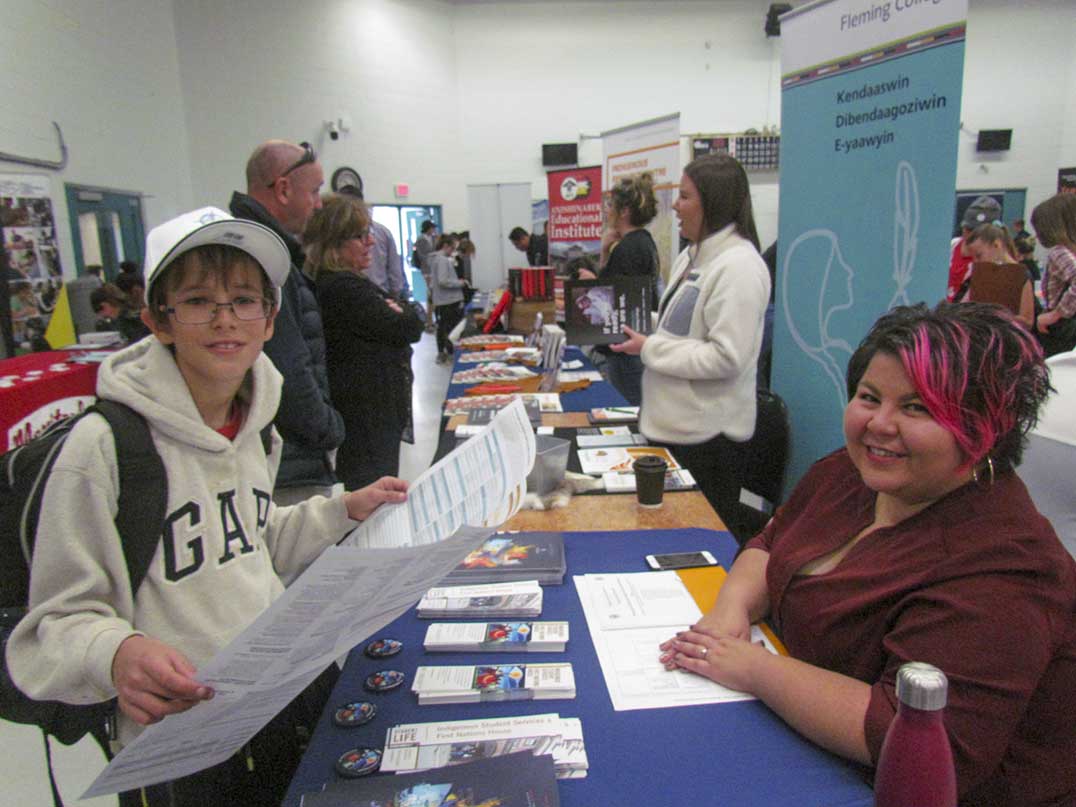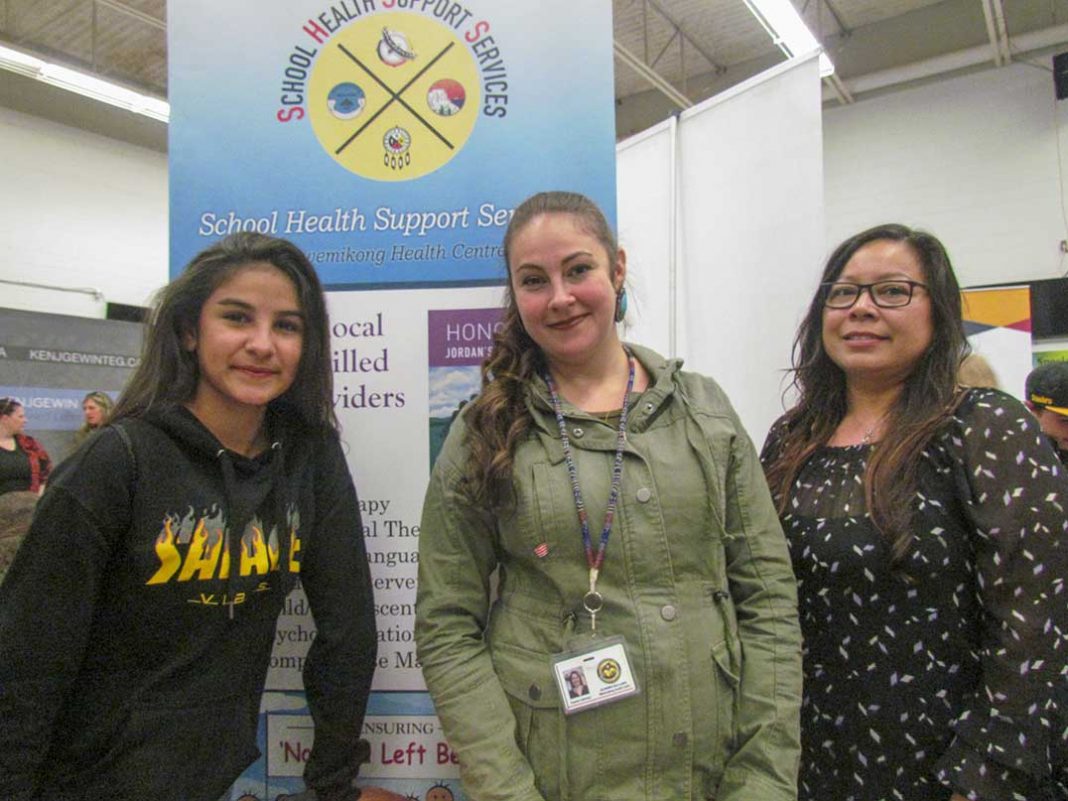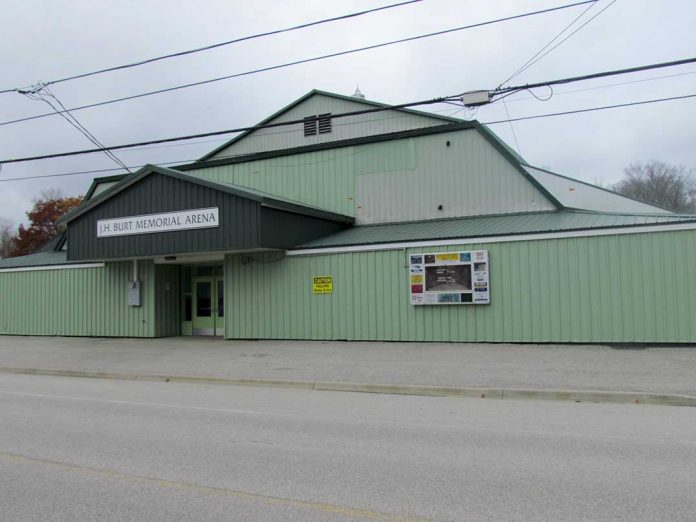M’CHIGEENG – Over 300 students and the general public attended the annual Kenjgewin Teg Career Fair which took place at the M’Chigeeng Community Complex on October 8.
The event has been held for many years and organizer Brian Bisson is pleased with the growth and rationale of the fair, saying “The Career Fair is a wonderful opportunity for the students to obtain information from employers or people working directly in the industry. Information could be related to working conditions, employment opportunities locally and nationally, educational requirements, special skills required and course salary ranges. Ontario education curriculum requires students to start studying the guidance stream in Grades 7 and 8 and the fair assists in that capacity. All the elementary schools on the Island attended this year. Students can gain information from employers or the post-secondary institutions as to which secondary school courses they need for certain occupations or programs. The fair is also an excellent opportunity for businesses and post-secondary schools to network. Training and funding opportunities could be exchanged. We were fortunate to have a representative from the Ministry of Training, Colleges and Universities and the Sudbury-Manitoulin Workforce Planning Board attend.”
The career event was hosted by Manitoulin First Nation HUB and Kenjgewin Teg (KT).
Several of the companies represented at the career fair were Island-based. These included lawyer Linda McDonald, Manitoulin-Sudbury District Services Board (DSB), Manitoulin Transport, McDougall Fuels, M’Chigeeng Health Services, M’nidoo Mnising Mental Wellness, Wiikwemkoong, Sweetgrass Pharmacy, UCCM Anishnaabe Police Service, Weengushk Film Institute, Wikwemikong Health Services, VCARS and the OPP, represented by Community Services Officer (CSO) Constable Marie Ford.
Of note this year was the group from 20 colleges and universities representing the Aboriginal Post Secondary Institutes Program (APSIP). Indigenous students entering college or university for the first time might feel more confident knowing that there are welcoming places for them.
Loyalist College, in Belleville, is home to the Indigenous Resource Centre that ensures appropriate support for Native students on campus and to act as a liaison between college administration, Native communities, and government agencies. First Nations House at the University of Toronto provides academic counselling, financial aid and planning, computer facilities, access to tutors, writing supports, elder-in-residence, cultural events and teaching and a mentoring program.
Tracy Jacko, of Sagamok, spoke with many students at the gathering. She is the recruitment officer for First Nations House and travels across Canada to enlist students in the University of Toronto where 97,000 students are enrolled.

Gezhtojig Employment and Training, Sudbury, also offers support for First Nations students with training, retraining and upgrading. They are helped with finding employment, making career decisions and exploring training options. It supports Indigenous communities in Sudbury, Manitoulin, North Bay, and Parry Sound.
Student Bradley Paibomsai of Aundeck Omni Kaning was particularly interested in speaking with the representatives of the Operating Engineers Training Institute of Ontario (OETIO) in Morrisburg. On hand to answer any questions regarding training in such areas as mobile cranes, heavy equipment, hoisting and rigging, hand signals and others were international union representatives Kirk Fournier of the Sudbury area and John Miners of the Sault Ste. Marie territory.
One of the most engaging representatives at the career fair was Sue-Ann Oshkabewisens, the aboriginal diabetes initiative program worker for the Wikwemikong Health Centre. With a large bowl of apples in front of her, she spoke with students of all ages who were interested in the healthcare field about diabetes and the programs she oversees. There are days to get moving, craft nights, cooking, harvesting and the diabetes café. Ms. Oshkabewisens spoke of her particular ploy for dealing with the sugar cravings that seem to come with diabetes. She freezes Halloween-sized chocolate bars and when she has a desire for a sweet, it will take a long time to finish that treat and by that time, her craving has gone.
School Health Support Services spoke with students about healthcare. Care co-ordinator Katarina Djeletovic and Karen Recollet said they visit schools in Wiikwemkoong, M’Chigeeng, Whitefish Falls and Sagamok to provide necessary services and ensure that Jordan’s Principle, named after Jordan River Anderson who was from Norway House Cree Nation in Manitoba, is followed. This means health, social and educational needs for Canada’s First Nations children including speech therapy, educational support, medical equipment and mental health services.
Mining companies were also participants at this event including Vale and Glencore, as well as the pulp and paper producer Domtar, the Ironworkers Local 786 and the Plumbers and Pipefitters Local 800. Students learned what was involved in working for these companies that provide jobs with high wages and benefits.
Reps from the Northern Academy of Transportation Training (NATT) spoke with the students about the many training programs they offer. This company has a 98 percent job placement success rate and courses range from AZ, DZ and air brake training to defensive driving and transportation of dangerous goods.
Students more inclined to the arts were interested in Design DePlume, an Indigenous-owned graphics company in Sudbury, and Weengushk Film Institute in M’Chigeeng.
Several of the companies at the fair had presentations including the Canadian Armed Forces and Hydro One and ambulance paramedic Alie Thompson was kept very busy taking students through the workings of the stretchers used to convey injured parties and the training and duties of ambulance attendants.
Mr. Bisson was pleased with the outcome of the fair and said, “The earlier the better for students to start planning their future after secondary school. Having the opportunity to talk with people in the profession will help guide and motivate them.”




